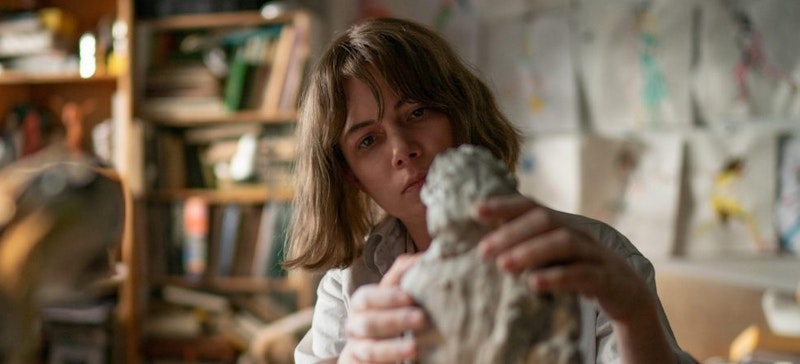In the year-long lead-up to the domestic release of Kelly Reichardt’s latest feature, Showing Up, I’ve found surprisingly little criticism or enthusiasm about the film—unlike 2019’s First Cow, whose planned March 2020 release was cancelled for obvious reasons. The movie still got coverage from NPR and major newspapers in those first six months of the pandemic, and if it had come out in the fall rather than the spring, I think it’s plausible Reichardt could’ve won Best Picture and Best Director over Chloé Zhao and her Nomadland. John Magaro might’ve even won Best Actor, but he didn’t, and unlike Zhao, Reichardt hasn’t been scooped up by Marvel, DC, or Disney to “direct” one of their adult baby products. Showing Up is familiar territory for Reichardt: Michelle Williams (in her fourth collaboration with the director) plays a Portland artist frustrated by the pettiness and purgatory of her community, from fellow artists to her colleagues at the local art college where her mother (Maryann Plunkett) also teaches.
Williams’ landlord is played by Hong Chau, another aloof artist who keeps dismissing Williams’ complaints about no hot water in her house; she’s the archetypal head-in-the-clouds art school charlatan, one with a “big show” coming up, networking and making connections. No one in this milieu is moving to New York or Los Angeles—they’re content (or resigned) to try to become the biggest fish in the pond that is the Portland art community. Reichardt, a longtime teacher at Bard College in New York, clearly mined her own experience nailing the details of this world, from the brand of potato chips Williams eats to the atmosphere of a gallery opening to the awkward internecine squabbles in administrator offices across America. Even though Williams is a sculptor embedded in this world, she’s our surrogate, our frustrated and irritated avatar to wander around Portland with and spend a couple of hours with art school people.
Cinematographer Christopher Blauvelt fills the movie with cutaways and interstitial shots that on their own may be inconsequential, but as they accumulate, they almost create a parallel movie, shot in the style of Robert Altman or even Frederick Wiseman, just painting as deep and detailed a portrait of this world. He also uses a number of very rough and crude pans, tilts, and zooms, as in the opening shot, as if to use the camera as a pencil, a quick sketch or survey tool. I’ve seen a lot of complaints that the ending of the film is “too Creative Writing 101,” but I found the flight of the injured pigeon surprisingly moving, even if John Magaro’s tinfoil hat character is essentially just acting as the “pigeon whisperer” in a room full of people so far removed from the Earth and what actually matters. The ending of Showing Up is immensely moving: a defeated artist too stressed to enjoy her own show, surrounded by friends and family who don’t care, validated by an avian miracle, something so perfect that it seems planned: what an opening!
The film ends with another series of interstitial shots tracking electrical and phone lines across Portland, and after about a half dozen, the camera finds Chau and Williams walking and talking, their contretemps alleviated by the miracle of the pigeon, and as they walk down into the Portland sunset, the camera slowly rises above them and stops just above a power line: Showing Up ends with the pigeon’s point-of-view shot, looking out and over our quotidian struggles and the days of our lives. The quiet authority in that final shot is so powerful, on par with the heights of Reichardt’s previous masterpieces Wendy and Lucy and Certain Women. This film is a Rorschach for modern art, art school, Portland—so your mileage may vary. But Reichardt’s considerable ability to communicate so much with just images and so few, if any, words places her in the highest echelon of working American filmmakers. Showing Up may “merely” be her third best film, but from someone as good as this, that’s a minor masterpiece.
—Follow Nicky Smith on Twitter: @nickyotissmith

